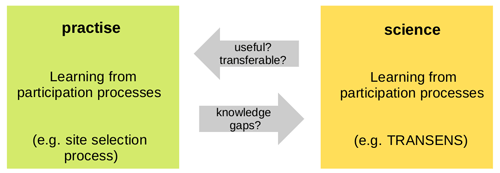Learning through participation processes
The Site Selection Act (StandAG) defines the selection of a repository as a learning process (lernendes Verfahren) in § 1. Learning is also an essential aspect of transdisciplinary (td) research projects – apart from capacity and network building in addition to supporting change. Transdisciplinarity means that different academic disciplines (interdisciplinary) work together with practitioners (e.g. citizens, NGOs and government officials) to integrate the knowledge, interests and values from various sources to solve a real-world problem (Klein et al., 2001). Joint working involves a functional dynamic collaboration of disciplines and societal actors, starting with problem framing (co-design) through problem analysis and exploring the impact at the end (co-production). Learning can take place during all phases of the research process and at all levels (i.e. from the individual to the institution). Moreover, how and what is learnt is specific to the project context, topic (e.g. renewable energy) and coincidence of different knowledge types (system, transformation and target knowledge). The Transdisciplinarity Lab (TdLab) carries out the accompanying research in TRANSENS. TRANSENS is one of the few td research projects found internationally in the field of nuclear waste management. The TdLab analyses, amongst other things, the learning that stems from participation activities. Therefore, we would like to identify the manifold learning experiences of stakeholder integration during the site selection procedure, on the one hand, and of td research projects, on the other hand. Taking into account the perspectives of citizens, practitioners and scientists, this interactive workshop seeks to accomplish the following (see Fig. 1):
-
make visible the learning areas from participation processes in the “real world” (practice; e.g. site selection process) and under “laboratory conditions” (research projects; e.g. TRANSENS),
-
identify the transferability of learning areas from science to practice (including limitations),
-
determine useful learning areas from research projects for practice, and
-
identify knowledge gaps in the “real world” for research projects in the future.
From the interactive workshop, we expect the identification of key learning areas, their specific relevance for nuclear waste management and the identification of topics for future research.






